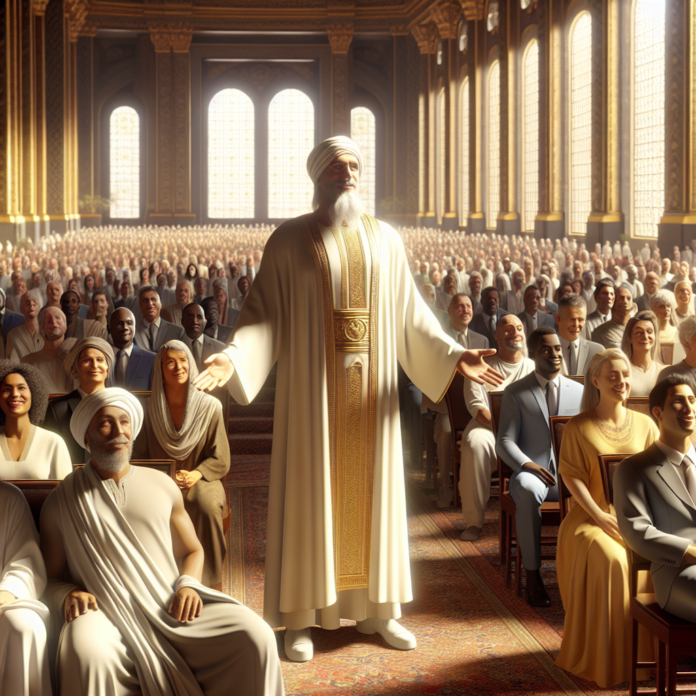Pope Francis Announces New Cardinals, Emphasizing Global Church Representation
In a powerful endorsement of the Catholic Church’s evolving identity, Pope Francis recently announced the creation of 21 new cardinals, underscoring his commitment to diversity and the global representation of the Church. The announcement, made from the Apostolic Palace before a vibrant assembly of thousands of pilgrims and visitors in St. Peter’s Square, aligns seamlessly with the Pope’s ongoing mission to broaden the horizons of the Catholic Church and focus on its universal nature.
This move is not just about filling the Church’s leadership tables with new members, but it reflects a more profound strategic direction for a more inclusive Church that resonates with both traditional congregants and those on the fringes.
A Global Reflection of the Faithful
Among the newly appointed cardinals, geographical representation is notably diverse, with appointees hailing from Latin America, Africa, Asia, and remote parts of Europe. In each selection, Pope Francis emphasizes the church’s commitment to a global approach, ensuring that voices from all corners of the world have a say in the sacred college that will eventually elect his successor. This is particularly poignant given that the Catholic Church is experiencing its most significant growth in regions like Africa and Asia.
The new cardinals include Bishop Stephen Ameyu Martin Mulla of Juba, South Sudan, and Bishop Jorge Enrique Jiménez Carvajal of Colombia. Bishop Ameyu’s elevation is particularly symbolic, given his leadership in a region that has known conflict and strife for decades. His appointment serves as a reminder of the Church’s role in reconciliation and rebuilding.
Meanwhile, Bishop Jiménez Carvajal’s appointment underscores Pope Francis’s interest in the Latin American church, which continues to be pivotal in theological discourse and grassroots activism. His contributions to peace negotiations and societal rebuilding affirm the Pope’s messaging that the Church must remain a beacon of hope in regions battered by violence and inequality.
Commitment to the Marginalized
Pope Francis has long been known for his dedication to inclusivity, often reaching out to those on the margins of society. His recent appointments are no exception. With cardinals from nations such as Mongolia and the Democratic Republic of the Congo, Pope Francis brings forward regions often overshadowed by global politics and economics, yet thriving with vibrant Catholic communities.
Father Giorgio Marengo, who has been serving as apostolic prefect of Ulaanbaatar in Mongolia, exemplifies the Pope’s commitment to evangelization in the most remote areas. Marengo has been a steadfast figure in Mongolia’s small but growing Catholic community. His elevation to the cardinalate highlights the universal scope of the Church’s mission and the Pope’s wish to hear every voice, no matter how distant.
Addressing Modern Challenges
The new appointees are also poised to tackle several pressing issues facing the Church today. From poverty and migration to climate change and social justice, these cardinals bring with them experiences and insights from their respective regions. Pope Francis has been a vocal advocate for environmental stewardship and social equity, and the new cardinals are expected to be on the front lines, pushing forward these critical discussions.
For instance, Bishop Matteo Zuppi of Bologna, who has been named a cardinal, is widely recognized for his work in fostering interfaith dialogue and his dedication to a Church that prioritizes social justice. Known for his hands-on approach in addressing societal issues in Italy, Zuppi embodies the kind of proactive engagement Pope Francis seeks in his senior clerics.
A Progressive Path Forward
By making these appointments, Pope Francis continues on a progressive path, steering the Church away from its Eurocentric past and towards a future that is increasingly multicolored and multicultural. His choices reflect a conscious decision to prioritize humility, service, and pastoral dedication.
This renewed focus on inclusivity and representation is significant, with implications for the Church’s doctrine and influence in global affairs. Importantly, many of the newly appointed cardinals share in Pope Francis’s progressive views, embracing more open stances on topics such as interreligious dialogue, poverty alleviation, and ecological preservation.
Pope Francis’s cardinal selections reveal an enduring commitment to a Church that transcends traditional hierarchies, aiming instead for a community that mirrors the diversity and vibrancy of its over one billion members worldwide. The pontiff’s vision suggests a future where the Church’s leadership more accurately embodies the universal love and humility that Christ preached.
As these new cardinals prepare to embark on their ecclesiastical responsibilities, their diverse backgrounds and experiences will undoubtedly enrich their contributions to the Church’s mission. Pope Francis’s actions reaffirm his belief that every culture, language, and people contribute to the Church’s strength, echoing the sentiment that the Catholic Church, now more than ever, is truly a universal institution.
Conclusion
In this era of unprecedented global interconnectedness, Pope Francis’s hopes for a Church that reflects the world’s diversity resonate deeply. As he continues to break new ground, the Pope’s vision emphasizes a future grounded in unity, understanding, and shared responsibility. This latest group of cardinals, with their breadth of worldly insight and spiritual wisdom, inaugurates a chapter in the Catholic Church that upholds progressive values while staying true to its fundamental spiritual mission—one that is, above all, about love and respect for all of humanity.
